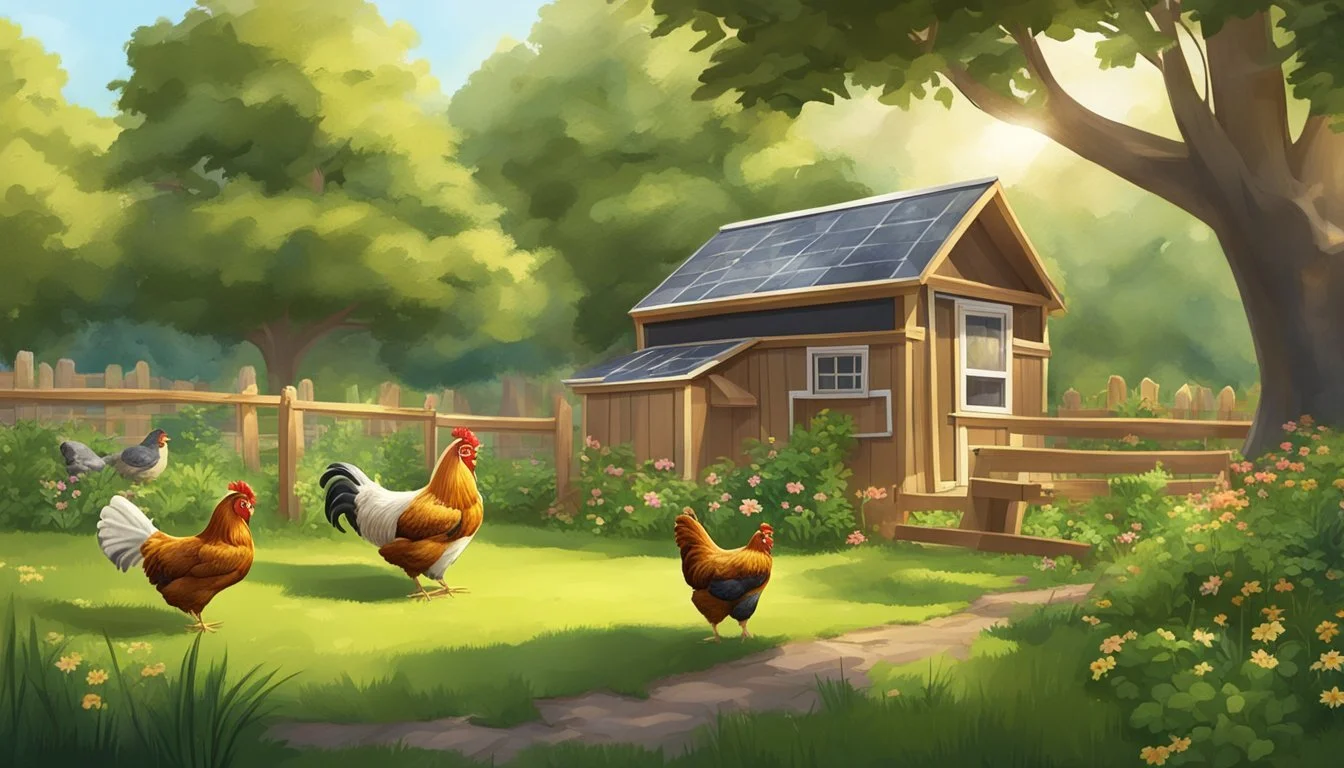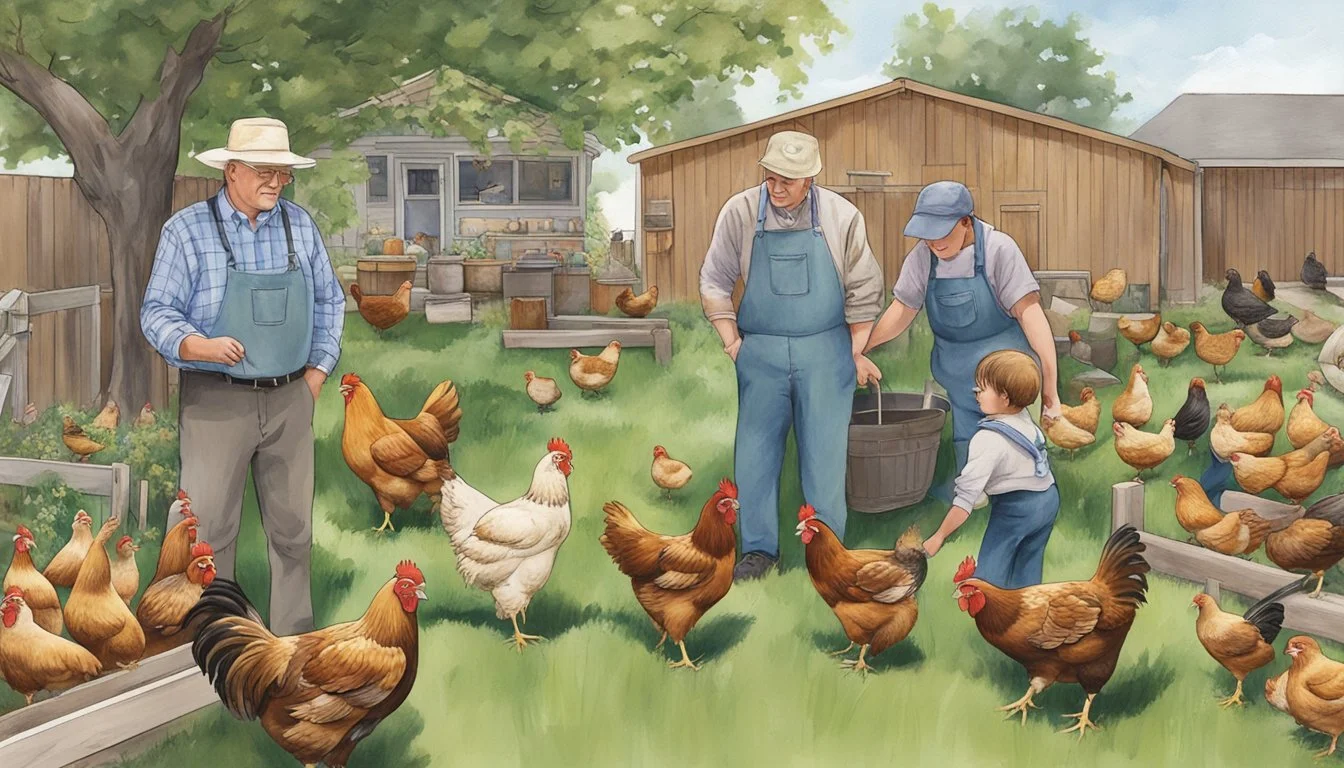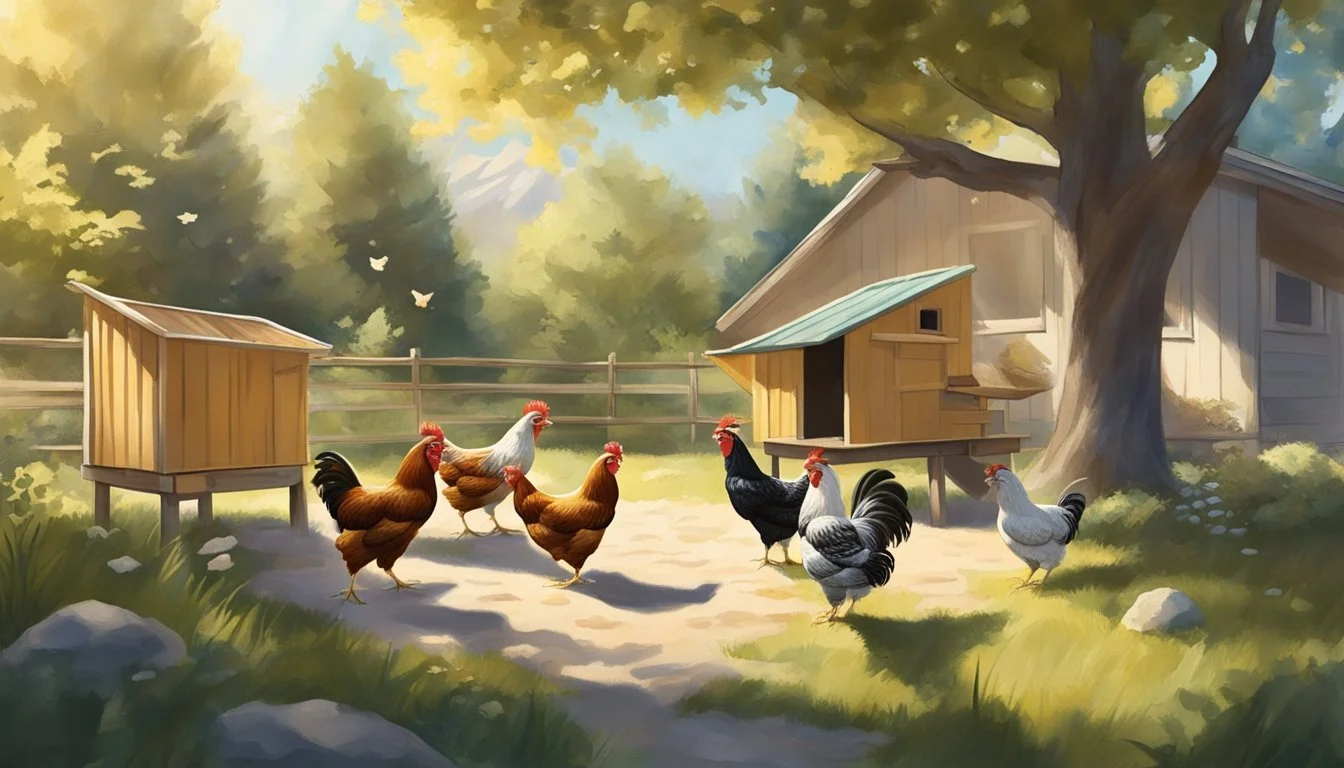Raising Backyard Chickens in Pocatello, ID
Essential Tips for Beginners
Over the last decade, the practice of raising backyard chickens has seen a surge in popularity in many areas, including Pocatello, Idaho. The appeal is multifaceted, offering fresh eggs, natural pest control, and the pleasure of animal husbandry. Residents of Pocatello looking to join the urban agriculture movement by keeping chickens must adhere to certain regulations to ensure that their venture is both successful and compliant with city ordinances.
The city of Pocatello specifies that each chicken must have adequate space requirements, with at least 3 square feet within the coop and 10 square feet in an outdoor run. These conditions are essential for the health and welfare of the chickens, as overcrowding can lead to stress, disease, and behavioral issues among the flock. Furthermore, coops must be placed at least 25 feet away from neighboring residential dwellings and 3 feet from property lines to prevent any potential nuisance to surrounding properties.
Maintenance of the living environment is crucial for raising healthy backyard chickens. Regular cleaning and sanitary practices minimize odors and pests, contributing to a more harmonious relationship with neighbors and ensuring the chickens’ well-being. Proper infrastructure, such as secure coops and predator barriers, is not only a matter of complying with local regulations but is also critical for protecting the flock in Pocatello's varied climate and from local predators.
Understanding Pocatello's Chicken Keeping Laws and Ordinances
Residents of Pocatello, Idaho, interested in raising backyard chickens need to be aware of specific local ordinances that regulate the practice. This section provides a detailed overview of zoning regulations, permit requirements, and limitations on the number of chickens allowed.
Zoning Regulations and Placement
In Pocatello, zoning regulations dictate where chickens may be kept. It's important for residents to verify their property's zoning classification and ensure compliance with setback requirements for chicken coops. These rules are essential to prevent conflicts with neighbors and to maintain the community's standards.
Permit Requirements
Individuals must adhere to local permit requirements when raising chickens in Pocatello. A permit may be necessary to legally keep chickens within the city limits. Prospective chicken owners should contact the city's relevant department to obtain the latest permit information and any associated fees.
Number of Chickens Allowed
Pocatello has specific ordinances that govern the number of chickens that residents can keep on their property. These limits are designed to ensure the health and well-being of both the chickens and the community at large. Residents must verify the current cap on the number of chickens permitted and abide by any regulations related to the keeping of roosters, which are commonly restricted.
Selecting the Right Chicken Breeds for Your Backyard
When raising chickens in Pocatello, ID, it's essential to choose breeds that align with your goals for egg production and purpose, adapt well to the local climate, and have a suitable demeanor.
Egg Production and Purpose
The primary intent for keeping chickens typically revolves around their egg-laying capabilities or their use as a meat source. Breeds like the Lohmann Brown excel in egg production, often providing over 300 eggs per year. Another prolific layer suitable for Pocatello backyards is the Golden Comet, noted for its friendly nature and impressive annual yield of 250-300 eggs.
Rhode Island Reds stand as a classic dual-purpose breed, providing substantial egg quantities and serving as a reliable meat source. Egg color varies by breed, adding diversity with hues of blue, brown, green, and speckled.
Climate Considerations
Pocatello's climate, with its cold winters, requires breeds that show resilience to frost and lower temperatures. Breeds such as the Sussex and the Araucana are well-suited for cooler environments, being both cold-hardy and good layers.
On the contrary, breeds like the Andalusians, adapted to warmer climates, are prone to frostbite in Pocatello's harsh winters and should be avoided. It is critical to match chicken breeds to your area's weather patterns for their well-being and productivity.
Disposition and Behavior
Behavior and temperament are equally important when choosing a breed. A chicken's temperament affects its ability to integrate into a flock and adapt to backyard living conditions.
The Golden Comet is known for its gentle disposition, making it an ideal choice for first-time chicken keepers. Similarly, Rhode Island Reds are noted for their docile and friendly nature, which can make managing your backyard flock more pleasant. On the other hand, some breeds may exhibit more assertive behaviors and require experienced handling.
It's recommended to consider these traits alongside your purposes and climate considerations to ensure a harmonious backyard coop.
Designing a Safe and Efficient Chicken Coop
Creating an optimal environment for chickens in Pocatello, ID, involves ensuring they have a safe and efficient coop. The design should include ample space, proper ventilation, robust security, cleanliness practices, and appropriate heating and lighting to support the chickens' health and productivity.
Adequate Space and Ventilation
Space Requirements:
Inside the coop: At least 4 square feet per chicken
In the chicken run: 8-10 square feet per chicken
Ventilation:
Why It Matters: To remove moisture and ammonia, prevent respiratory issues
How to Achieve It: Install vents or windows that provide cross-ventilation without causing drafts
Security Against Predators
Materials: Use hardware cloth instead of chicken wire for windows and runs
Locking Mechanisms: Install predator-proof locks on all coop doors
Tips:
Bury the hardware cloth 12 inches underground to deter digging predators
Regularly inspect the coop for potential weak spots or gaps
Maintaining Cleanliness
Flooring: Consider materials like sand or straw for easy cleaning
Waste Management: Implement a schedule for regular removal of waste to keep the coop sanitary
Design Consideration: Sloped floors can assist in drainage and waste removal
Coop Heating and Lighting
Heating: In Pocatello's colder months, use safe heating elements like a panel heater
Lighting: Provide 14-16 hours of light per day to promote laying
Placement Tips: Ensure any heating and lighting devices are installed away from flammable materials and out of reach of chickens to prevent accidents
By focusing on these specific areas when designing your coop, you provide a structured and secure home for your chickens, which encourages health and egg production.
Feeding and Nutrition for Optimal Health
Providing a balanced diet and understanding the different types of chicken feed are critical for the health and productivity of backyard chickens in Pocatello, ID.
Balanced Diet and Supplements
A chicken's diet must contain a mix of grains, proteins, and essential nutrients. Proteins are vital for growth and egg production, and key amino acids such as methionine and lysine must be included. Vitamins A, D3, B12, and E, along with minerals like calcium for eggshell quality, and phosphorus, are crucial. Layers require increased calcium, which can be supplied by adding oyster shell supplements to their feed.
Grains: Base of the diet, providing carbohydrates for energy.
Proteins: For growth and egg production (Include amino acids).
Vitamins & Minerals: Vital for overall health and egg quality.
Calcium: Particularly important for laying hens for strong eggshells.
Feeder Placement and Types
Strategic feeder placement and selecting the right type of feeder can minimize waste and ensure chickens have constant access to their food.
Placement: Feeders should be placed in a dry, sheltered area to protect feed from the elements.
Types: Choose feeders that help reduce spillage and are appropriate for the flock's size. Trough feeders, tube feeders or automatic feeding systems can be considered.
Understanding Chicken Feed Types
The type of feed provided will vary depending on the chickens' life stage:
Starter Feed: Rich in protein to help chicks grow, typically around 20-24% protein.
Grower Feed: Contains slightly less protein (17-18%).
Layer Feed: Has added calcium to help form strong eggshells, appropriate once hens begin laying eggs.
Chickens also require fiber and enzymes to aid in digestion, which can be found in quality commercial feeds formulated for each life stage.
Maintaining Chicken Health and Managing Disease
In Pocatello, Idaho, the health of backyard chickens hinges on preventative measures and responsive care. Addressing diseases swiftly and effectively is crucial to maintaining a healthy flock.
Regular Check-Ups with Veterinarians
It's essential for chicken owners to arrange regular veterinary check-ups. These visits allow for early detection of potential health issues. Veterinarians can provide guidance on optimal nutrition, living conditions, and can spot the early signs of disease.
Vaccination and Disease Prevention
Disease prevention is facilitated through a vaccination program tailored to local disease risks. Backyard flock owners should consult with local veterinarians to determine which vaccines are necessary, as this can vary depending on regional disease prevalence.
Identifying Common Chicken Ailments
Recognizing signs of common diseases is a critical competency for any chicken owner. Some symptoms to watch for include:
Changes in behavior or appetite
Respiratory distress
Diarrhea or changes in droppings
Lethargy
Unusual feather loss
Immediate consultation with a veterinarian is advisable when any of these signs are observed. They can provide accurate diagnoses and treatment options.
Daily and Seasonal Chicken Care Routines
In Pocatello, ID, backyard chicken enthusiasts must adapt their care routines to accommodate both the daily needs of their chickens and the challenges posed by seasonal changes. By implementing consistent practices for egg collecting, addressing the molting season, and establishing regular cleaning schedules, they ensure the well-being of their flock throughout the year.
Egg Collecting Practices
Daily egg collection is a vital part of chicken care routine. Egg collecting should occur at least once a day to ensure eggs remain clean and to discourage brooding. The peak laying time is often in the morning, so coordinators of the chore should plan accordingly.
Frequency: Collect eggs once or twice daily.
Timing: Optimal after the peak laying hours, but before nightfall.
Storage: Eggs should be stored in a cool, dry place before washing to maximize freshness.
Managing Molting Seasons
Chickens in Pocatello experience molting, usually in the fall, leading to a decrease in egg production. During the molt, birds shed and regrow feathers, which diverts their energy from egg-laying. It is important to support their nutrition demands with increased protein intake.
Diet Adjustment: Increase protein-based feed.
Stress Reduction: Limit handling of chickens as molting can be stressful.
Observation: Monitor the flock for any signs of complications related to molting.
Cleaning and Maintenance Schedules
Regular coop maintenance and manure management are crucial to preventing disease and ensuring a healthy environment. Coop cleaning should be a combination of daily spot checks and more thorough weekly tasks.
Daily:
Spot clean to remove soiled bedding.
Check waterers and feeders for cleanliness and refill as needed.
Weekly:
Replace all bedding to control manure and odor.
Inspect the coop structure for signs of wear or damage, especially with Pocatello's varying weather.
Bi-Annual:
Conduct a deep clean, removing all bedding and washing the coop with a diluted bleach solution.
By adhering to these routines, keepers can maintain a healthy and productive backyard flock.
Enhancing the Backyard Flock's Environment
Creating a conducive environment for backyard chickens promotes their wellbeing and productivity. This environment includes providing proper nesting boxes for comfort during egg laying, incorporating interactive elements to stimulate their natural behaviors, and ensuring sufficient space to manage the pecking order.
Interactive Toys and Activities
Chickens are naturally inquisitive creatures that benefit from environmental stimulation. Offering a variety of interactive toys—such as treat balls, perches, and ladders—can prevent boredom and encourage physical activity. Activities like dust baths and pecking at suspended vegetables mimic their natural foraging behavior, engaging their senses and maintaining healthy, active birds.
Nesting Boxes and Egg Laying Comfort
Nesting boxes provide a dedicated space for hens to lay their eggs. Each box should be filled with clean, soft bedding such as straw or wood shavings. Adding herbs like marigolds to the bedding can enhance the comfort of the hens and deter pests. The general guideline for backyard flocks is to have at least one nesting box for every four hens to avoid overcrowding and stress, which can affect egg laying frequency and quality.
Managing the Pecking Order with Space
Chickens establish a pecking order to maintain social structure within the flock. Adequate space in the coop and run allows chickens to express their natural behaviors and reduces the likelihood of stress and aggression. To manage the pecking order effectively, structure the space with sufficient feeders and water stations, and provide hideouts or barriers where lower-ranked chickens can escape to when needed.
By focusing on these key aspects, one can greatly improve the backyard flock's environment in Pocatello, ID, leading to happier chickens and a more bountiful harvest of eggs.
Community Engagement and Legal Compliance
Raising backyard chickens in Pocatello, ID requires not only a commitment to animal care but also an engagement with the community and strict adherence to local laws. This section highlights the significance of building relationships with local farmers, considering neighborly impacts, and conforming to state and city regulations.
Connecting with Local Farmers and Groups
Community members interested in raising chickens can benefit from connecting with local farmers and backyard chicken groups. These connections offer:
Local Expertise: Experienced farmers can provide practical advice on best practices for raising healthy chickens and managing a coop.
Supplies and Chickens: They may also be sources for obtaining chickens, feed, housing materials, and other necessary supplies.
Understanding Impact on Neighbors
Backyard chickens can influence neighbors' quality of life. Residents should:
Communicate: Inform and discuss plans with adjacent homeowners to mitigate concerns about noise and sanitation.
Coop Positioning: Ensure the chicken coop is a minimum of 25 feet away from neighboring dwellings, respecting their living space.
Compliance with State and City Regulations
Adherence to Pocatello's regulations for backyard chickens is essential. Key regulatory elements include:
Space Requirements: Chickens must have at least 3 square feet in the coop and 10 square feet in the run.
Property Lines: Coops should be no less than 3 feet from property lines.
Number of Chickens: Pocatello may dictate the number of chickens based on the property size; residents should check current limits.
Roosters: Often excluded within city limits due to noise; check for specific Pocatello guidelines.
Residents of Pocatello must comply with these standards to ensure a harmonious and legal backyard chicken-raising experience.
Preparations for Absences: Ensuring Continuity of Care
When raising backyard chickens in Pocatello, ID, reliable arrangements must be made to maintain their care during an owner's absence. Automatic systems and clear care plans are pivotal for continuity of care.
Using Automatic Coop Doors and Feeders
Installing automatic coop doors ensures that chickens are safely housed at night and have access to their run during the day. Owners can set these doors to open and close on a timer, aligning with sunrise and sunset. As for feeding, automatic feeders regulate the amount of food provided, maintaining a consistent feeding schedule while owners are away on vacation. They must be:
Weatherproof, to withstand Pocatello's variable climate.
Predator-resistant, to protect feed from rodents and other wildlife.
Capable of holding sufficient food for the duration of the absence.
Creating a Chicken Care Plan for Vacation Time
A comprehensive chicken care plan is essential for times when technology may fail or when personal oversight by a neighbor or caretaker is necessary. This plan should detail:
Daily chores: feeding, egg collection, checking water supplies.
Emergency contacts: the vet, a knowledgeable fellow chicken-keeper.
Special instructions: detailed information on the individual needs of each chicken.
Assigning responsibility to a trusted individual with this plan in hand ensures that the chickens' welfare is managed competently in the owner’s absence.
Sustainable Practices and Long-term Considerations
Raising backyard chickens in Pocatello, ID, necessitates a commitment to sustainable practices that ensure animal welfare, economic viability, and environmental responsibility. Owners must manage resources effectively and consider the implications of their practices for the local ecosystem.
Managing Waste and Manure
Proper waste and manure management is crucial for maintaining a healthy, odor-free, and ecologically balanced backyard space. In Pocatello, it's important to compost chicken manure, a rich source of nitrogen, before applying it to gardens to avoid nutrient runoff into local waterways.
Composting Methods:
Regular Turnover: Ensure frequent turning of the compost pile to aid in breakdown.
Carbon-rich 'Browns': Add leaves or straw to balance the nitrogen-heavy chicken manure.
Implementing Eco-friendly Coop Upgrades
To support a sustainable lifestyle, chicken coops in Pocatello should leverage renewable resources and minimize waste.
Renewable Energy: Install solar panels for electricity needs.
Water Conservation: Set up a rainwater collection system for coop water.
Insulation: Ensure proper insulation to reduce heating expenses.
Responsibilities of Raising Chickens for Meat or Eggs
There are distinct responsibilities when raising chickens for meat or egg-laying purposes, each requiring sustainable approaches.
For Meat:
Breed Selection: Opt for breeds that grow at a natural rate and are suited to the Pocatello climate.
Feed-to-Meat Ratio: Maximize feed efficiency to reduce costs and environmental impact.
For Egg-Laying:
Nutritious Feed: Ensure laying hens receive a balanced diet for quality egg production.
Habitat: Provide ample space and nesting areas to prevent stress and encourage regular laying of fresh eggs.
Advanced Tools and Accessories for Chicken Keeping
As backyard chicken keeping evolves, a range of advanced tools and accessories have become available to enhance the experience. These products aim to reduce common problems such as pecking and odor, while also improving the safety and efficiency of chicken care.
Anti-Pecking Solutions
To mitigate pecking amongst chickens, anti-pecking sprays can be applied. These sprays are formulated to taste bitter to discourage pecking behavior. Hardware cloth is also an essential item, it can be used to separate aggressive birds and to reinforce the coop, thereby preventing pecking injuries and offering protection from predators.
Coop Deodorizers and Cleanliness Enhancers
Coop deodorizers play a crucial role in maintaining a clean and pleasant environment. These substances often contain natural enzymes that break down odors and waste. Regular use can significantly reduce the unpleasant smells associated with chicken coops.
Recommended Coop Deodorizers:
Enzyme-based spray deodorizers
Absorbent bedding additions
Surveillance with Coop Cameras
Coop cameras offer peace of mind by allowing keepers to observe their chickens remotely. They provide live footage which can be accessed via smartphones or other devices, ensuring that any unusual activity or emergency is noticed promptly.
Coop Camera Features Description Night Vision Enables 24/7 monitoring, crucial for detecting nocturnal predators. Motion Detection Alerts owners to any movements within the coop.
Efficient Chicken Processing Tools
For those who raise chickens for meat, efficient processing tools such as automatic chicken pluckers enhance the process. These devices cleanly remove feathers within minutes, greatly reducing the labor-intensive aspect of chicken processing.
Key items for efficient processing:
Chicken Pluckers: Simplify feather removal with rapid, automated efficiency.
Butchering Sets: Provide the necessary sharp tools for a clean and humane processing operation.
By incorporating these advanced tools and accessories, chicken keepers in Pocatello, ID can ensure a more effective, clean, and safe environment for their backyard flocks.
Conclusion
Raising backyard chickens has become a popular endeavor in Pocatello, ID. While the practice can be rewarding, residents must educate themselves on local regulations and best practices. The city mandates suitable living conditions for the chickens, with each bird requiring 3 square feet in the coop and 10 square feet in the run.
For those considering this activity, the importance of coop placement cannot be overstated. Coops must be 25 feet from neighboring dwellings and 3 feet from property lines to ensure a harmonious community. This careful positioning, coupled with diligent maintenance and cleanliness, is essential for the health of the chickens and the community.
In terms of egg production, one can anticipate a steady supply from well-cared-for chickens. A nutritious diet, proper shelter, and adequate space contribute to the flock's ability to lay eggs consistently. However, potential keepers need to verify zoning regulations, as roosters are often prohibited, which affects flock dynamics and egg fertilization.
Agricultural trends indicate a steady interest in backyard chicken raising. Pocatello residents who invest time and resources into their chicken ventures can look forward to the satisfaction of self-sufficiency and the joys of connecting with their food sources. With proper care and adherence to city guidelines, they can ensure both the well-being of their chickens and a harmonious relationship with their neighbors.













